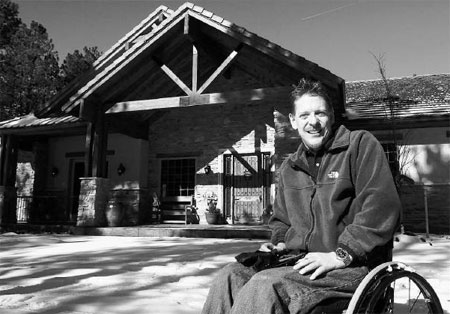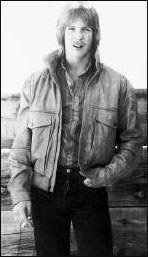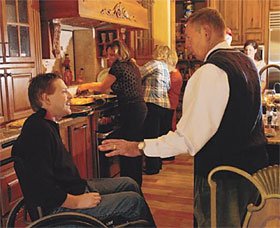The Story of Dave Hammer, Custom Home Builder
Local to Monument and Colorado Springs
Dave Hammer says the gunshot that paralyzed him also saved his life.
by Rich Laden, THE GAZETTE | 2007
Strong-willed. That’s how friends describe Dave Hammer. It’s a characteristic that can cut both ways. It serves Hammer well as a family man and head of a Colorado Springs company that builds custom homes. But as a self-described teenage punk in the 1980s, he defied authority and got into trouble with alcohol, drugs and the law. Even when he grew older and tried to put his problems in the past, his strong will led to a tragic incident — a road-rage shooting in which he was paralyzed from the chest down. Driving home from work one evening in January 1987, Hammer, then 20, confronted another motorist in a central Colorado Springs neighborhood. A passenger in the other car shot Hammer in the throat, and the bullet severed his spine. Doctors said he should have died at the scene. He didn’t, but Hammer was hospitalized for a year and a half and today uses a wheelchair.

The gunshot that paralyzed me also saved my life.
These days, Hammer says, Christianity dominates his life. And it’s his faith that has helped him understand that the shooting probably saved him from greater tragedy. “If it wasn’t for that,” Hammer said of the shooting, “I don’t know where I’d be today. Most of the friends I hung out with either died or are in prison. It was God’s way of saving my life.” At a time when he gathers with family and friends to give thanks, the 39-year-old Hammer says he can’t thank God enough for his life since the shooting: deeply committed relationships with his teenage son and second wife; a remarkable reconciliation with the father he hadn’t seen in nearly 25 years; and a successful business that builds six- and seven-figure homes. “I’d much rather be the man I am today in a wheelchair than the adolescent I was back in 1987,” Hammer said. “I have no regrets looking back.”
Cherise Selley, a real estate agent who markets Hammer’s homes, met him seven years ago. “I think maybe he lost his legs to save his life,” she said. “I’ve learned from this situation and knowing Dave. You can’t put people in a box. There are ways to overcome your circumstance and live above that, where you stop seeing the wheelchair and start seeing the person. That’s what’s happened over the years that I’ve known Dave.”
TOO MANY WRONG CROWDS
Hammer was born in New Jersey, and his parents divorced when he was a toddler. His mom, Stephanie Hammer, had custody, but she was an admitted drug user. She sent Dave and his older sister, Jennifer, to live with their grandmother and great-grandfather. “In hindsight, it was a terrible thing to do,” said Stephanie Hammer, who now lives in Colorado Springs. The decision launched Hammer into a life of delinquency. His grandmother and greatgrandfather sent him to a Maine boarding school where he broke rules, smoked pot and, in the eighth grade, ran away and hitchhiked to New York City. Hammer eventually ended up with his mother in Santa Fe, N.M., but she couldn’t handle him, and sent him to live with friends in Buena Vista. No matter where he went, Hammer said, he fell in with the wrong crowd. He stole stereo equipment from a Christian ministry ranch in Buena Vista, ran away from the state mental hospital in Pueblo and got in a high-speed chase with a police officer.
At age 16, Hammer wound up at the Dale House Project in Colorado Springs, an arm of Young Life that takes in abused and delinquent teens and teaches them how to find a job and handle money, among other things. For the first time, he said, he found a structured life — dinner at 6 p.m., a curfew, prayer and discipline — although out of love and not as punishment, he said. “It was the first time I had stability,” Hammer said. “I had accomplishments and acceptance and unconditional love.” He also said it was when he became a Christian. It was a defining moment for Hammer; his faith offered him a roadmap for a better life, even if he didn’t always follow it. Dale House director George Sheffer described Hammer as a likeable person. But, “he had a lot of anger, a lot of family issues,” Sheffer said. “There were times he could get very rebellious.” Ken Briggs, who owned a woodworking business in the early 1980s and who also served as a Dale House counselor, said he remembers pinning Hammer up against a wall a few times. “He was hard to rein in because he had such a bullish personality,” said Briggs, who now operates Youth Ventures of Colorado, a private social-service child-placement agency. “He was so strong-willed. He’s still strong-willed.” Under Briggs, Hammer learned carpentry and other woodworking skills. Hammer left Dale House in 1984, and Briggs hired him two years later at his woodworking business.
ANOTHER REASON TO LIVE
Even with his newfound faith, Hammer said, he continued to pal around with the wrong people, drinking and smoking pot. And he still had a hard edge.

On Jan. 12, 1987, Hammer was driving his pickup truck home from work. With his girlfriend, Christina Fox, in the passenger seat, Hammer got into a dispute with three men in another vehicle. For several blocks, the drivers exchanged taunts and gestures, cut each other off and tailgated one another. When they stopped at Uintah Street and Union Boulevard, Hammer got out of his truck and banged on the other driver’s door. That’s when a 17-year-old passenger got out with a gun. “You feel like dying today?” Hammer recalled the man saying. “Click, boom.”
From about 3 feet away, Hammer was hit in the throat by a single shot from a .357 revolver. He remembers flying backward, thinking he had landed on his head. Hammer said he recalls asking his girlfriend: “Where are my arms and legs?” He said he knew immediately he was paralyzed; the bullet had ripped through his spinal cord after entering through his neck. He spent three months in Memorial Hospital’s intensive care unit, then 15 months at Craig Hospital in Denver. Grueling months of rehab followed. Today, Hammer can’t walk or stand, but he can move his upper body. He can shake hands with his right hand, wheel himself around in his wheelchair using both arms, and drives a minivan equipped with hand controls. “I’m very independent,” Hammer said. “I’m more independent than the doctors said I’d ever be.”
Briggs, who remains Hammer’s friend, watched Hammer struggle through rehab. “It was his tenacity and his willingness to fight through pain and surgery after surgery and infection after infection” that helped him through, Briggs said. Hammer doesn’t disagree. But in the hospital, he said, he found another reason to live. He didn’t know it until after he was shot, but his girlfriend was pregnant. The two were married in the hospital, and became parents of a son, also named David. “What kept me alive, basically, was at that point, I had hit rock bottom,” Hammer said. “I’m lying on a bed, and I can’t move. I was totally paralyzed and incapacitated. When I found out I was going to have a son that I always yearned for, that drove me. Knowing that I was going to have a son kept me alive.”
Hammer left the hospital in 1988. He took classes at Pikes Peak Community College and enrolled at the University of Southern Colorado. He received a bachelor’s degree in social service work, graduating in 1992. He took a job as a counselor in a child-placement agency. His disability, however, fractured his marriage; he was divorced in 1996. Hammer said he was determined not to abandon his son the way he felt abandoned after his parents divorced. Hammer’s son, now 19, lives with his father. The two have had a close relationship; Dave Hammer said he’s cheered and coached David when he played hockey, and, now, when he races motorcycles and cars. Those are the kinds of things Hammer never had the chance to do with his dad, whom he hadn’t seen since he was about 3. In a reunion both say was arranged by God, however, Hammer’s father re-entered his life.
Jerry Wolfbauer was a real estate broker on Long Island when he said he attended a June 7, 1994, meeting of the Promise Keepers, the international ministry that encourages men to become better Christians. At that meeting, Wolfbauer said, he struck a bargain with God: Take all of my possessions, he pleaded, but let me be reunited with my children. Two weeks later, Wolfbauer said, he received a call from his former wife, who told him that his children would like to hear from him. The two hadn’t spoken in more than 20 years, she said. As Wolfbauer recalls it, “She said, ‘Your kids need you. Would you like to be in touch with them?’ I said sure. I nearly died.” During that conversation, Wolfbauer said, he learned about Dave’s troubled youth and his paralysis. About the same time, Dave Hammer said, his own spirituality began to grow and he began attending New Life Church on Colorado Springs’ far north side.

Dave Hammer, left, talks with his father, Jerry Wolfbauer, as Hammer’s wife, Debbie, center, prepares a Thanksgiving meal at a Hammer Home in Cathedral Pines.
One Sunday, a husband and wife he didn’t know asked if they could pray with him, Hammer said. What did they want to pray about? Family reconciliation, they answered. That night, as Hammer recalls it, he went home to find two messages from his mom. He also found a third message — from his father. The two had an initial phone conversation. “Then,” Wolfbauer said, “I thought, darn it, I’m going to send pictures of myself. And I did that. David got the package. He wouldn’t open it, but a bunch of his buddies said to open it. He opened it, and he began to cry. At that point he called. He said, ‘Dad.’ I hadn’t heard that for 20 years.” Wolfbauer left his real estate business on the East Coast and moved to the Springs in 1995. Wolfbauer worked as a real estate agent and lived with Dave, who was growing disenchanted with his social work. Wolfbauer said he made a proposal to his son: that he go to night school and get his building contractor’s license, while Wolfbauer would look for lots on which to build homes. They found some in Monument, Wolfbauer said, and Hammer oversaw the home construction. “He was on his way,” Wolfbauer said. He added: “This kid has done more with his disability than people who have full functions of their body. It’s just incredible.”
ATTENTION TO DETAIL
Hammer Homes started in 1999, and the company now builds four to eight custom homes a year, priced from $500,000 to $2 million. Hammer’s partner, Rick Lane, was the man who offered to pray with him at New Life Church. Hammer Homes built a $1.6 million, ranch home in the Cathedral Pines subdivision in Black Forest, north of the Springs, that was featured in the 2006 Parade of Homes. Hammer and his family are living there until it’s sold. The home is a far cry from Hammer’s woodworking days at the Dale House. The nearly 6,100-square-foot home has four bedrooms and bathrooms, a six-car garage on two levels, a home theater, a gourmet kitchen, an elevator and dual verandas that look out at a scenic, 2.5-acre wooded lot, among other amenities.
Being a builder means paying attention to detail, Hammer said. He regularly visits home sites to inspect construction; work crews carry him through homes as they’re being built, he said. Lane, his partner, was working in construction when they met at New Life. They attended church together and socialized. When Hammer started his company, Lane joined him. Matt Dunston, co-owner of Custom Castles, another Springs home builder and a friend, said Hammer has an “amazing ability” to get along with others and to resolve problems. He never uses his disability to solicit favors, Dunston said. In fact, his disability probably has forced him to become a better businessman, Dunston said.
Hammer carefully scrutinizes all of his projects; because of his physical limitations, he can’t afford to spend time and money going back to make changes, Dunston said. “His opportunity to make money is based solely on his ability to make decisions and to work with people,” Dunston said. Hammer’s disability also has been factored into his homes, although in subtle ways. The Parade of Homes model in Black Forest, for example, has 36-inch-wide doorways and 48-inch-wide hallways and light switches set low on walls — all to accommodate someone in a wheelchair. But Hammer doesn’t dwell on his disability; he prefers to push himself in his wheelchair, even as he takes medication to reduce muscle spasms, Lane said. “Our worst days are his best days,” Lane said. Lane also said Hammer has learned lessons from the shooting. If someone cuts him off on the road, or if an angry driver makes an obscene gesture, Hammer ignores them, Lane said. And when it comes to guns, Lane said, Hammer has no desire to be around them. “They’re for hunting,” Lane has heard Hammer say.
Hammer lives with his son, David, and his second wife, Debbie. The couple met last year at Penrose Hospital, where his dad was undergoing surgery and where she worked at an information desk. “She has made me want to be a better man,” Hammer said. “She has been a tremendous blessing.” Stephanie Hammer, wanting to be closer to her son and grandson, moved to Colorado Springs from New Mexico about 1½ years ago. Dave’s sister, Jennifer, also lives in the Springs. On Thanksgiving, Hammer’s wife, parents, sister, son and other friends — about 20 in all — gathered for dinner at his house.
“It’s totally the Lord that has saved my life and made my life what it is today,” Hammer said. “All the glory goes to God, not myself. He’s the one who has given the strength, the faith, the humility and the life that’s in my heart today. He’s blessed me in so many ways.”
[Story and photography reprinted with permission of The Gazette]
